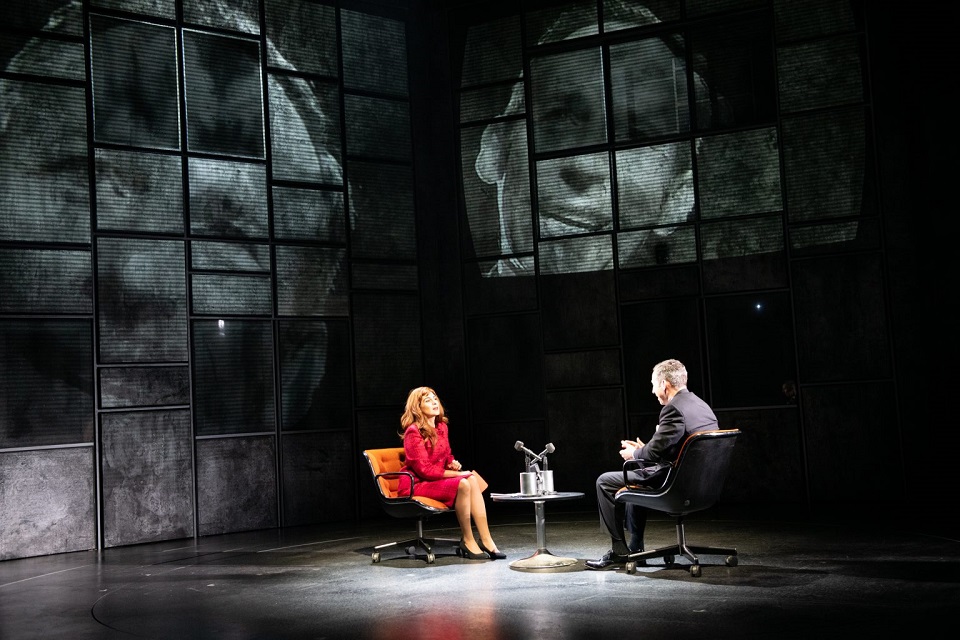
BETHESDA, Md.—Ink, a four-year-old play from London’s West End running at the Round House Theatre in Bethesda, Md., through September 24, portrays the craziness of British journalism. And it needs an American sequel.
Why? Because James Graham’s work, based on facts and/or truthful conclusions, portrays the early United Kingdom career of Rupert Murdoch, the Australian-born media baron whose newspapers and television networks have dramatically reshaped journalism—and politics—on both sides of “The Pond,” the colloquial British term for the Atlantic Ocean.
Excellently played by an all-Actors Equity cast, Ink tracks the opening years of Murdoch’s News Corp. goal of first cracking and then later dominating, the British newspaper market.
Brash, blunt and totally focused on “giving the readers what they want, not what they need,” Murdoch’s Sun specializes in giving those readers—who he believed were the British white working class—what they want:
Outright lies
Sex—the “Page 3” women, scantily clad—scandals, screaming headlines, nationalistic jingoism. And, often, though the Sun didn’t say so, outright lies.
Never mind that sometimes the scandals weren’t. Never mind that virtually every headline was in humongous type in ALL CAPITAL LETTERS. And never mind that at least one scandal backfired badly on Murdoch, at least in his early years in the United Kingdom, the time period Ink covers. (A later and worse scandal involving another Murdoch paper, which engaged in massive illegal wiretapping, is not covered in the play.)
And never mind that there was little to no real news, either.
“The only point of a newspaper is to sell papers,” Murdoch, played by Andrew Rein, and his handpicked sleazy editor Larry Lamb (Cody Nickell) keep insisting over and over again. Murdoch even insists on that mantra in a sit-down interview with a television reporter who protests that readers need news.
But Murdoch and Lamb succeed at their goal, using their formula, replacing the “why?” of traditional journalism with “What’s next?” And they overthrow the British press establishment in London’s Fleet Street in the process.
The two recognize the untapped news market in the UK in the days of typewriters, hot leaded type pounded and locked into printers’ chases, and intense competition. London alone had at least six “national” papers, including the pre-Murdoch staggering Sun. The only non-London “national” paper was the then-Manchester Guardian, which has since dropped the “Manchester” from its masthead.
All those papers had their own niches of the market, including political niches. The Daily Mirror led the journalistic pack. The Mirror, a tabloid like the Sun, also has huge headline type in all capital letters.
But Mirror Editorial Director Sir Hugh Cudlipp (Craig Wallace) nattily dressed in a dark suit, white shirt, tie and prim pocket handkerchief, epitomizes the fact the Fleet Street papers were run by “old guard” traditional journalists, who relaxed in posh clubs, not corner pubs, and who believed in giving readers “what they need,” news.
Often shirt-sleeved and tieless while wandering around his newsroom, Murdoch is exactly the opposite, as he was in Australia and as he would be in America. Lamb, who still wears a tie and jacket for his lunches with his boss, eventually becomes even more gung-ho than Murdoch.
At the Mirror, Cudlipp is eventually kicked upstairs. And the Fleet Street papers are struggling.
Schemed to move to the suburbs
Murdoch also schemed to move to the suburbs. There, his staff wouldn’t be “corrupted” by contact with the old guard, he could experiment with desk-top computers in the newsroom and he could “get away from the unions.” Before that, Lamb brings in a young out-of-work bartender to scab by setting type when the printers refuse to do so on a particularly sleazy story.
And while the rest of Fleet Street shuns television as a competitor, Murdoch embraces it, captured in Ink by a telecast rapid-fire 30-second ad in one long run-on screaming sentence, just like the Sun’s screaming headlines. “Only in The Sun!” it exhorts at the end.
The play portrays one big trip-up. The Sun runs a story that angers a particularly sleazy group. They demand a retraction and a ransom. To prove their resolve, they kidnap a Sun staffer’s wife, Muriel McKay (Kate Eastwood Norris). The Sun refuses and prints a photo of their demand on its front page. The kidnappers kill Muriel McKay. Her body was not found until two years ago, Wikipedia reports. Two kidnappers were arrested and convicted years before.
The murder gives Murdoch, for once, second thoughts about the personal impact of his incessant drive for ever-increasing eyeballs on his paper. How far is too far? Lamb’s reaction: “We drew even more readers.”
And as a way to finally overtake the Mirror as top dog in circulation, Lamb convinces a young woman staffer to pose for a Page 3 photo, nude. She reluctantly agrees and the photo itself—a side-on black-and-white shot of the young woman sitting in a spring-like field, facing left, not at the camera, knees drawn up to her chest and arms wrapped around them—is briefly displayed on the set’s background.
“I’m going to be known about this for the rest of my life,” she says. She’s right. But it sold more papers.
There are a few points that Ink, which runs more than two hours, needs to flesh out more. The leading one is politics.
There is only one fleeting reference to British politics, where Murdoch tells editor Lamb during one lunch that “we should start cultivating the Conservatives,” England’s Tory Party. His first step: Setting up a lunch with Ted Heath, then the Prime Minister and a member of the British upper class, and arranging a second lunch with an up-and-coming fiery member of Heath’s Cabinet, Education Minister Margaret Thatcher.
Yes, that Margaret Thatcher, who used her later reign as Prime Minister to—among other things—launch a class war against the Trades Union Congress and a real imperialist and jingoist war against Argentina over the Falkland Islands/Malvinas. Both wars occur, though, after the time scope of Ink.
Murdoch never took to Heath. The PM was too “establishment.” But Murdoch and his papers—by then he owned more than just the Sun—embraced and promoted “The Iron Lady,” Thatcher.
And Murdoch is more complex, and U.S. newspapering, like its British counterparts, is not pristine. When, years later, Murdoch’s News Corp. buys a paper in another niche, The Times of London, basically the paper of the British royals, he doesn’t change it. Don’t sacrifice your market.
Buys the Wall Street Journal
And when, crossing to this side of the ocean, Murdoch buys the Wall Street Journal, he doesn’t change it, either. No sleaze, no screaming headlines, no scantily clad women. He didn’t need to change the Journal’s editorials and op-eds, just make them more right-wing than ever. Again, don’t sacrifice your established market.
Which brings us back to why Ink needs a sequel. Because at the end of the play, Murdoch muses about bringing his sex-scandal-screaming headlines combo to the U.S. Some of his following steps are traced in white-on-black crawls flashed on the rear of an empty and darkened stage.
“Do you wonder why, in our world right now, truth is an optional concept owned by the storyteller who screams the loudest?” asks Artistic Director Jason Loewith of Olney Theater, which is jointly producing Ink but at the Round House Theatre in Bethesda.
“Why is journalism on life support? Why has the truth become a subject of debate? Why have facts and science been thrown aside for opinion and fabulation?” he adds in Playbill.
“James Graham is discovering this in every play he writes. Great theater that investigates our past helps make sense of our present.”
Murdoch jumped “The Pond” when he bought his first two U.S. papers, the San Antonio Express-News and the venerable New York Post, a mildly progressive tabloid then losing its niche in the ultra-competitive metropolitan New York market. The San Antonio paper was the first to undergo the Murdoch treatment, screaming headlines, right-wing jingoism and all.
Your reviewer knows: As part of an entry-level job in D.C. journalism decades ago, he scanned 63 regional newspapers from around the U.S., clipping them for political news. San Antonio was one. Screaming headlines and scandals, yes. Political news, no.
That, too, has changed. Murdoch’s screaming headlines are still there on most of his papers and even more so on his network, Fox “News.” The scandals, real or imagined, are still there. So are the lies.
And politics combined with lies are there, big-time, in the U.S.’s Murdoch-land. One name says it all: Donald Trump.
That’s why Fox News is his megaphone, still. That’s why Fox paid $787 million to Dominion Voting Systems after Fox, knowing they were lies, defamed Dominion’s voting machines during and after the 2020 presidential election. That’s just one example.
Murdoch not only succeeded in the U.S. newspaper business, but he’s succeeded even more hugely in broadcast, cable and among manic—maniac?–commentators, viewers and readers. The more outrageous, the more irresponsible, the more lies equals the more readers and viewers. Yes, Murdoch’s found that same audience on this side of “The Pond” that he found in the U.K.
So there’s the name for whenever Graham writes a follow-up play to Ink:
Fox.
We hope you appreciated this article. At People’s World, we believe news and information should be free and accessible to all, but we need your help. Our journalism is free of corporate influence and paywalls because we are totally reader-supported. Only you, our readers and supporters, make this possible. If you enjoy reading People’s World and the stories we bring you, please support our work by donating or becoming a monthly sustainer today. Thank you!










